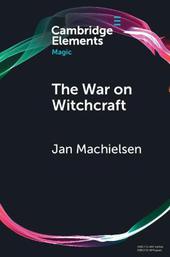
|
The War on Witchcraft: Andrew Dickson White, George Lincoln Burr, and the Origins of Witchcraft Historiography
Paperback / softback
Main Details
| Title |
The War on Witchcraft: Andrew Dickson White, George Lincoln Burr, and the Origins of Witchcraft Historiography
|
| Authors and Contributors |
By (author) Jan Machielsen
|
| Series | Elements in Magic |
|---|
| Physical Properties |
| Format:Paperback / softback | | Pages:75 | | Dimensions(mm): Height 227,Width 151 |
|
| Category/Genre | Religion and beliefs
Occult studies
Mysticism, magic and ritual |
|---|
| ISBN/Barcode |
9781108948746
|
| Classifications | Dewey:133.430722 |
|---|
| Audience | | Professional & Vocational | |
|---|
| Illustrations |
Worked examples or Exercises
|
|
Publishing Details |
| Publisher |
Cambridge University Press
|
| Imprint |
Cambridge University Press
|
| Publication Date |
22 July 2021 |
| Publication Country |
United Kingdom
|
Description
Historians of the early modern witch-hunt often begin histories of their field with the theories propounded by Margaret Murray and Montague Summers in the 1920s. They overlook the lasting impact of nineteenth-century scholarship, in particular the contributions by two American historians, Andrew Dickson White (1832-1918) and George Lincoln Burr (1857-1938). Study of their work and scholarly personae contributes to our understanding of the deeply embedded popular understanding of the witch-hunt as representing an irrational past in opposition to an enlightened present. Yet the men's relationship with each other, and with witchcraft sceptics - the heroes of their studies - also demonstrates how their writings were part of a larger war against 'unreason'. This Element thus lays bare the ways scholarly masculinity helped shape witchcraft historiography, a field of study often seen as dominated by feminist scholarship. Such meditation on past practice may foster reflection on contemporary models of history writing.
Reviews'... Masculinity emerges as an important theme. Machielsen shows that White and Burr both saw history as a story of Great Men, and actively valued masculine characteristics. I hope that this book will be taken up as a contribution to the history of nineteenth-century masculinity.' Julian Goodare, Folklore
|